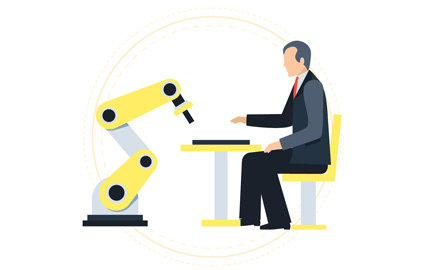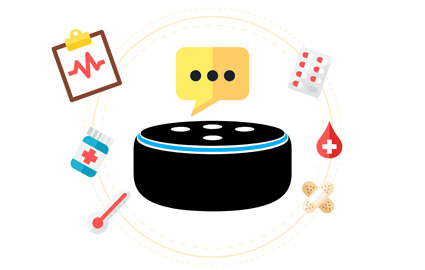Artificial intelligence (AI) is a rapidly developing branch of technology whereby machines have been granted the capacity to learn from the data they gather.
In popular culture (particularly in films like I, Robot and Ex Machina), AI has been presented as both a thrilling and dystopian concept, but today AI is not just a theme of Science-Fiction associated with human subservience and self-serving robots, but rather is evident in the world as we know it.
Now that AI has become more familiar to a global audience, with deployments by internet conglomerates like Google with their ever-evolving search engine algorithm that learns from the searches and linguistics of users, more people embrace the technology with the promise of simplified information retrieval.
Forrester Research predicted that AI, Internet of Things and Big Data technology will be worth $1.2 trillion by 20201. Therefore, taking this into account, it is logical to suppose that machine learning and automation will be even more widespread in the future. But how will this shape society? Will we see redundancy en-masse affect even some of our more human professions, such as teachers and healthcare practitioners?

The more tasks that AI technologies can accurately perform without the need for human intervention, the more apprehensive the public are about being replaced by machines. The ratio between time spent and work completed could be drastically improved by AI taking on tasks that cannot be carried out by humans to the same speed or accuracy, such as data collection/entry. Nonetheless, the idea of machines being ‘more qualified’ and economically efficient for certain jobs than humans is naturally alarming.
Regardless, AI should not solely be perceived as a threat, there are definite benefits of working alongside artificial learning systems.
For example, the AI assistants often referred to as chatbots can help to satisfy customers at any hour in a global industrialised market. Chatbots are programmed to answer questions and can be available for 24-hour customer service on a company’s website. Chatbots do not tire and are not restricted to specific working hours, so when customer service professionals are out of the office, chatbots can help manage customer queries in their absence.
For many customers, being able to talk to a real person who can offer assistance with compassion and human understanding is highly desirable as the nuances of human interaction and flexibility of thought are yet to be perfected by AI-powered solutions like chatbots.
Yet, instead of either replacing humans with machines or boycotting machines altogether, combining both improves efficiency without endangering human purpose. The collaboration between man and machine melds unbiased facts with empathy and understanding, a balance that can revolutionise customer service.
It is understandable that there is some concern that the mass deployment of AI will leave some people jobless, but it must not be forgotten that the sheer existence of AI is as a result of human ingenuity, and to train, design, and maintain AI systems, humans still play a significant role.
As further AI require implementation across the global market, more jobs will be created.

When it comes to business operations and admin within the workplace, AI can help boost productivity by allowing staff to focus on bigger projects and responsibilities.
Paperwork and administration is a notoriously monotonous task that can dominate a substantial percentage of the working day, so the ability to delegate this workload to AI is incredibly valuable. As the volume of tech-savvy start-ups developing these AI-based solutions continue to surge, the future of back-office and administrative procedure is likely to be much smoother and time-efficient.
HyperScience, a provider of AI-powered paperwork and data processing automation, is a key example of the many enterprises working to optimise workplace processes to benefit companies and their customers by freeing up valuable time for staff to work on more human-focused tasks, such as client-relationship maintenance. HyperScience’s back-office solutions automate data entry and employ image recognition to scan documents and accurately decipher handwriting2.

With the introduction of GDPR in 2018, data protection has never been so critical, and although machine learning/AI is reliant on learning from data, AI could be instrumental in ensuring GDPR compliance. Unlike a human being, AI systems can be conditionally programmed to follow a set of specific guidelines with preset outcomes based on data decisions. The main cause of data breaches is human error, with 50% of UK employees having admitted to unintentionally leaking private information via rushed emails or other sensitive data accidentally featuring in correspondence with people or organisations that should not have access to such private information3.
Although AI could be of great use for flagging and avoiding data breaches, there is an issue surrounding the obscurity of the machine learning process. GDPR insists that when someone’s data is processed (e.g. for a mortgage application), they have a right to an explanation, meaning that the AI system would be obliged to explain how it came to a decision (e.g. whether to accept or reject an application). Although a human would easily be able to explain this, AI machines process data in an incredibly complex way with an extraordinary amount of steps, making a simplified explanation very difficult to obtain.
In order to create GDPR compliant AI, data scientists will need to work towards achieving more transparency in regard to the processes of machine learning and find a way to convey insights into these processes to those entitled to explanation about the use of their data.

A human priority has always been the preservation and promotion of life, and as technology becomes increasingly sophisticated, many facets of healthcare are set to be transformed by the implementation of AI.
The trailblazing AI device, Amazon’s Alexa, is currently being used as a basis for the development of multiple different healthcare solutions to help patients monitor their health, order prescriptions, and aid the focus of improving personal health. More information on this can be found in another of our articles, ‘Can Amazon's Alexa Safely Transform Healthcare?’
Another pioneering example of AI’s value in healthcare is IBM’s AI system, Watson. Using both machine learning and natural language processing, its capabilities include processing and analysing medical data as well learning from this data (e.g. learning about a specific patient’s ailments) in order to make diagnostic and treatment decisions. The system has already taken impressive strides in healthcare, with 99% of its recommendations for treatments matching medical advice given by doctors4.

The accomplishments of Watson in the field of healthcare extend even further. The Japanese subsidiary of Watson has also successfully detected a rare type of leukaemia; identifying life-saving treatment at a speed far quicker than could be achieved by manual genetic data analysis. This is an amazing achievement that indicates how impactful AI could be, as lives that would otherwise be lost can be saved.
AI systems that can calculate predictions about a patient’s health from medical data are been tested and developed all over the world. In fact, researchers at the University of Nottingham have produced their own system designed to scan patients’ medical data, and from this, predict which of them would go on to experience a stroke or heart attack within 10 years.
The researchers tested four different machine learning algorithms by processing over 370,000 different UK patients’ medical records dating from 2005 to 2015. These records detailed illnesses, prescriptions, test results, and hospital appointments/visits.
From this experiment, the researchers learned that machine learning tools could accurately predict 355 more incidents of stroke or heart attack than the methods commonly used by medical practitioners5. As a result of systems like this, the future is likely to be much brighter as the rates of detection and prevention of diseases increase.
The rapid development and intricacies of AI learning and ability to predict and to a certain extent think beyond data, consequently means that AI will become a powerful assistant to healthcare practitioners in the future. As an instrumental technological advancement, AI would be best implemented as a tool to support doctors rather than replace them.

The pressure of accurately diagnosing or detecting illnesses in such a high pressure environment as a medical practice can be overwhelming for doctors and can lead to human error, so by using such tools as those tested at the University of Nottingham, the experiences of doctors as well as patients can be improved.
Although AI faces some steep learning curves to overcome, including GDPR compliance and job security in certain industries, the benefits of AI far outweigh the negatives.
A future with safely implemented artificial intelligence across all aspects of society is a future in which quality of life, health and public services are more sustainable and affordable.
As long as a healthy and productive balance between humanity and artificial intelligence is achieved by only delegating appropriate roles to AI, there is no need to fear a world overrun by ruthless machines.
1Press, G. (2016). Forrester Predicts Investment In Artificial Intelligence Will Grow 300% in 2017. [online] Forbes.com. Available at: https://www.forbes.com/sites/gilpress/2016/11/01/forrester-predicts-investment-in-artificial-intelligence-will-grow-300-in-2017/#1c7d24955509 [Accessed 24 Apr. 2019].
2Hyperscience.com. (n.d.). HyperExtract for Forms: Automate Data Entry and Form Processing. [online] Available at: https://www.hyperscience.com/product [Accessed 24 Apr. 2019].
3Webb, C. (n.d.). GDPR: Can Artificial Intelligence help become compliant?. [online] Freestyle. Available at: https://www.freestyle.agency/blog/gdpr-artificial-intelligence [Accessed 24 Apr. 2019].
4Lohr, S. (2016). IBM Is Counting on Its Bet on Watson, and Paying Big Money for It. [online] Nytimes.com. Available at: https://www.nytimes.com/2016/10/17/technology/ibm-is-counting-on-its-bet-on-watson-and-paying-big-money-for-it.html [Accessed 25 Apr. 2019].
5Otake, T. (2016). IBM big data used for rapid diagnosis of rare leukemia case in Japan | The Japan Times. [online] The Japan Times. Available at: https://www.japantimes.co.jp/news/2016/08/11/national/science-health/ibm-big-data-used-for-rapid-diagnosis-of-rare-leukemia-case-in-japan#.XMGhRuhKjIV [Accessed 25 Apr. 2019].